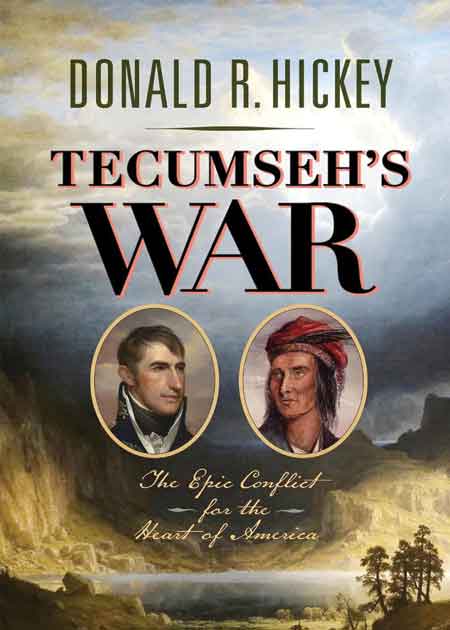By Donald Hickey.
Yardley, PA: Westholme Publishing, 2023.
ISBN 978-1-59416-405-7. Maps. Illustrations. Notes. Bibliography. Index.
Pp. xxiii, 520. $34.95.
It is not uncommon for the average person to think about America’s military ventures in five phases: the Revolutionary War, the Civil War, World War II, the Vietnam War, and recent conflicts in the Middle East. Only true history buffs will be able to tell you anything about other, less recognizable wars like the Spanish-American War or the various Indian Wars of the 1700s and 1800s.
This is where Donald Hickey’s great new work, Tecumseh’s War: The Epic Conflict for the Heart of America comes in, bringing what is often considered the last great Indian War out of its relative obscurity and further into the mainstream. Hickey’s thesis relies on the fact that Tecumseh’s War was a conflict not separated in scope from the War of 1812 but rather intertwined in it, and this idea is well illustrated throughout the work (p. xviii, 28) For instance, the primary engagement in Tecumseh’s War is undoubtedly the Battle of Tippecanoe in 1811. While Hickey uses the first 100 pages to set up this particular engagement and the broader conflict(s), he saves more than 300 to explore later events, their ramifications on American history, and the common memory of the war.
By placing Tecumseh’s War separate from, but within, the broader context of the War of 1812, readers see how all of the events of both wars impact one another. Battles like those of Lake Erie, Forts Meigs and Mackinac, and the Thames are examined from the ways each war was impacted. The Battle of the Thames is probably the most significant since it is where Tecumseh fell in battle.
More than just dealing with the war, Hickey considers the leadership of both sides. Tecumseh and his brother, the Prophet Tenskwatawa, along with William Henry Harrison and others, serve as the book’s main actors. Great detail is included, showing each commander’s humanity first, before any historical, philosophical, or political judgment is passed. Harrison’s modesty in rations is admirable. Likewise, he never flogged anyone for desertion; instead, he told them what they would find at home, if they made it: humiliation (p. 93).
In that same vein, Tecumseh is shown to be a compassionate belligerent in the war. While his oratory skills are very well known, more than that, he connected with his people. In efforts to tie the native nations together, he joined previously warring bands to a single noble cause; the defense of family, tradition, and land, making true believers out of the warriors and their families under his care. Similarly, he showed prisoners of war dignity and compassion, defying the contemporary and modern notion of Indian savagery. Overall, Tecumseh’s War offers readers an examination of effective leadership alongside a narrative of the titular war.
Criticisms of the book are minor, but worthy of discussion. Like many books of this size, it can be easy to lose sight of the overall thesis. While a historian or studious reader can still follow the narrative and all the involved players, a more casual reader could easily become overwhelmed. Similarly, this work requires explanations of the actions of many individuals, some of them prominent figures, others less so.
Regardless, at times, the brief mentions, while important to the overall book’s cohesion, often lack the nuance needed to explain a person’s thoughts or deeds, which can sometimes lead to generalizations at best and mischaracterizations at worst. Finally, an avid history reader may be somewhat disappointed with the truncated bibliography and extensive but at times confusing citations.
Hickey’s ninth book about the War of 1812 era is a valuable read of an oft-forgotten topic. While Hickey sets the stage for more interconnectedness of the primary conflict, he does a fabulous job of keeping the two wars separate. As such, he works to bring Tecumseh’s War further into the mainstream. As we continually reevaluate our history, drawing differing conclusions, and considering alternative motivations, Tecumseh’s War certainly commands a place on early 1800s American history shelves.
Al Dickenson
West Allis, Wisconsin
